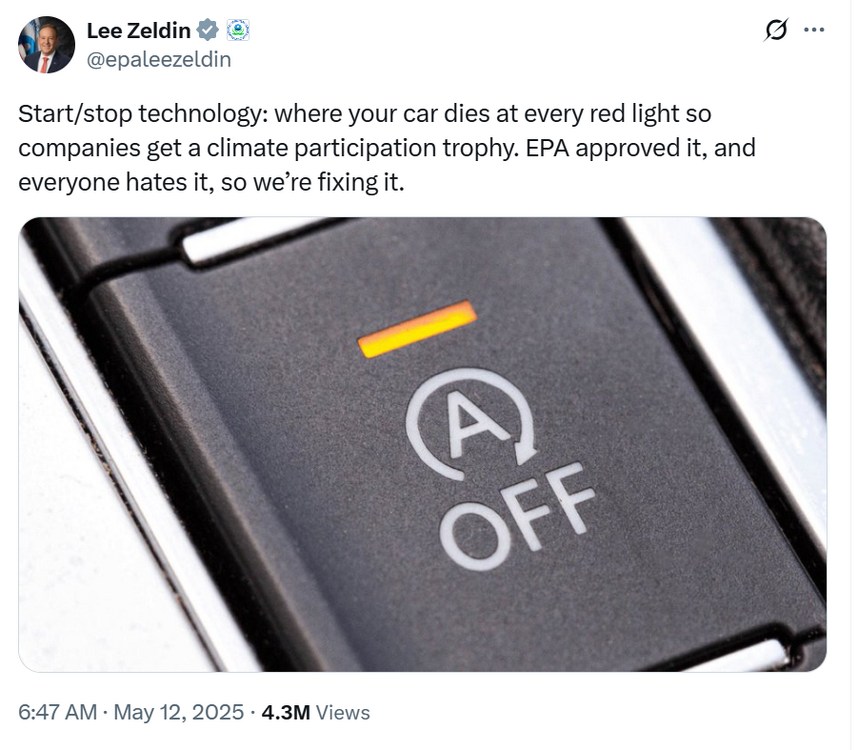-
Posts
14705 -
Joined
-
Last visited
-
Days Won
14
Content Type
Profiles
Forums
Store
Downloads
Recruiting - 2020
2019-2020 Football Season
Football
Entertainment
Sports
News and Business
Cloak Room
Transfer Portal
Recruiting
Events
Posts posted by Francisco 2.0
-
-
Crossposting from the ICE thread:
-
 1
1
-
 2
2
-
 1
1
-
-
On the other hand:
-
 1
1
-
 2
2
-
 1
1
-
-
1 hour ago, Chuckie Finster said:
A couple of months ago my mother randomly ranted about how unfair it is that Pete Rose is not in the Hall of Fame. I was taken aback, as I didn't know anyone had thought about Pete Rose in years. Finding out it's a MAGA thing makes SO MUCH sense now.
Thing is, there is a shit-ton full of Pete Rose stuff in the Hall already. I've been there 3 times, so I know. Yes, he was not enshrined in the "Hall", but it wasn't as if his name was never mentioned elsewhere in the hall, nor was he photoshopped out of Reds photos that are on display, etc.
One thing that I am going to assume was galling over the years to the Baseball Writers (and the Hall itself, and quite possibly MLB) was during Hall of Fame week, Pete would post up at some memorabilia place in Cooperstown and sell shit, sometimes directly across the street from the Hall.
-
-
Gotta hand it to the Sauds. They know how to flatter Donald.
-
 1
1
-
 5
5
-
 1
1
-
-
-
Quote
Last year, the rightwing think-tank the Heritage Foundation launched Project 2025, which laid out much of the policy blueprint for the current Trump administration. One of the project’s espoused goals was to permanently criminalize all pornography. Now, a Republican senator with kind words for Trump has introduced a bill that would do just that.
QuoteSenator Mike Lee (R-Utah) recently introduced the Interstate Obscenity Definition Act (IODA), which would effectively criminalize all pornography nationwide by legally redefining what it means to be obscene. For years, “obscenity” has been all but a defunct legal category that narrowly defines speech that remains unprotected by the First Amendment. Lee would explode this legal category, expanding it to encompass virtually all visual representations of sex.
QuoteAccording to the bill text, “a picture, image, graphic image file, film, videotape, or other visual depiction” of any media that “appeals to the prurient interest in nudity, sex, or excretion” would be considered criminal. In other words, if you have an old VHS tape of some Cinemax-style smut stashed away in your garage, you could, under this law, be considered to be harboring deeply illicit materials. Some critics have suggested that Lee’s definition of obscenity is so ridiculously broad that it could effectively criminalize Game of Thrones. That said, the punishments for merely possessing porn under the proposed law seem unclear at this point, as the legislation seems more focused on punishing the creators and distributors of racy material.
SpoilerThe law would “pave the way for the prosecution of obscene content disseminated across state lines or from foreign countries and open the door to federal restrictions or bans regarding online porn,” The Daily Caller writes.
“Obscenity isn’t protected by the First Amendment, but hazy and unenforceable legal definitions have allowed extreme pornography to saturate American society and reach countless children,” said Lee, in a press release about the bill. “Our bill updates the legal definition of obscenity for the internet age so this content can be taken down and its peddlers prosecuted.”
Lee’s view of pornography hews closely to that of the Heritage Foundation, which has similarly sought to crush the smut industry. In its Mandate for Leadership, Project 2025 defines pornography as the “omnipresent propagation of transgender ideology and sexualization of children” and argues that the “people who produce and distribute it should be imprisoned” and that “telecommunications and technology firms that facilitate its spread should be shuttered.”
It should be noted that porn has always been a hot-button issue and that critics have long tried to criminalize it. The history of the anti-pornography movement in the U.S. is a long and complicated one, littered with differing ideological justifications and strange bedfellows. In recent years, however, the anti-porn crusade has largely been led by the MAGA right.
Much of the modern anti-porn movement has sought to focus on the harmful psychological impact that pornography may have on young web users and children. It has targeted online access to porn by instituting age-verification requirements for porn websites that bar underage users. Over the past decade, over a dozen states have passed legislation designed to curb youth access to porn, much of which is still being challenged in court.
-
 3
3
-
 2
2
-
-
-
I'm guessing Mr. Greer will be unemployed soon:
-
 1
1
-
 4
4
-
-
- Popular Post
The governor of South Dakota as of January 2025 was [checks notes] Kristi Noem.
https://www.keloland.com/news/local-news/noem-cuts-fema-grant-program-that-benefited-south-dakota/
QuoteNearly $10 million in FEMA grants will not be coming to South Dakota, because of a decision by Homeland Security Secretary Kristi Noem.
The grants were part of a program called Building Resilient Infrastructure and Communities, or BRIC. Noem ended the program last month, calling it “wasteful” and “ineffective.” However, the FEMA website says the grants are for updating infrastructure and reducing the risk of future disasters.
QuoteThe cuts hit Walworth County the hardest. It lost a nearly $4 million grant. Rapid City lost a $2.6 million grant, and the town of Chancellor lost nearly a $500,000.
FEMA’s website’s no longer has information on which South Dakota projects are being affected.
While Noem ended the grant program in April, the state didn’t reveal how the cut would impact South Dakota until this week. To see the full list of federal funding cuts in South Dakota, click here.
And how did the fine folks of Walworth County, South Dakota vote in the past 2 elections?
2024 Presidential:

2022 Gubernatorial

-
 1
1
-
 3
3
-
 5
5
-
 1
1
-
 1
1
-
 12
12
-
-
I'm so glad we don't have children running the FBI
-
 3
3
-
-
But I was told the children were gone.
-
 4
4
-
-
Holy product placement.
-
 1
1
-
-
https://unherd.com/2025/05/doge-has-devoured-musk/
QuoteWhen I flew into Washington DC at the start of March, I didn’t expect much in the way of excitement. Yet by coincidence, my arrival to give a talk for the Elliott School of International Affairs, at the George Washington University, would coincide with the start of a DOGE purge of one of the government bureaucracies: the General Services Administration (GSA). As I went to bed in my hotel near the mall, the “DOGE boys” were moving in just across the street.
QuoteThe world of federal employment in America is almost a separate society. It has its own culture, its own acronyms, rules and concepts that appear foreign and opaque to those outside it. At a time of massive demographic shifts, of illegal immigration and the importation of guest workers — which have conspired to radically alter the workplace for both American blue- and white-collar workers — the federal workforce appears almost as an anachronism. Outside this walled garden, to be a worker or an employee in the year 2025 is to be an economic unit, a cog in a machine, one that can be replaced or fired at will. When a company in the private sector lays off its workforce and replaces it with foreigners, that is simply shrewd business management: it is replacing one human widget with a cheaper one in Bangalore. But even as these crass economic forces ravaged much of America, the federal workforce has managed to (mostly) stand apart.
QuotePartly, the good fortune of federal workers comes down to the sheer inertia of the system and all the rules that protect them. But another factor is a matter of a widely held and genuine belief: a worker in the private sector may only be measured in terms of economic value, but in the public service things are different. To work in public service is to be a civil servant: it is to maintain and fulfil the grand republican experiment America started some 250 years ago.
SpoilerReplacing an American coder with one from Bangalore is one thing; replacing an American civil servant with a foreigner or a computer is quite another. Once you reduce a society to numbers and cents, you no longer have a society. Among federal workers, this is the common refrain: you might not get paid nearly as much as somebody in the private sector, but you will be a part of something else, something you can’t really put a dollar value on. Until, that is, DOGE entered the picture.
When DOGE fires people, it deploys at least two distinct methods. The first is by its nature both wide and sweeping, with very little distinction made between useful workers and the “dead weight”. Essentially, it is the mass firing of those on probationary status, meaning that the usual job protections do not apply to them. In theory, these workers seem like a pretty natural place to start if one wants to “cut the fat”, but in practice it’s both awkward and destructive. It’s not just new workers who are on probation, but others too for various reasons — those who have been recently promoted, for example.
It is these untargeted mass firings — done simply because of a quirk of the legal system that regulates federal employment — that have led to the many cases where DOGE has had to apologise and walk back their decisions. Air traffic controllers weren’t fired by DOGE because they were all “woke”, or because they were all “unproductive” or surplus to requirements. They were fired, rather, because someone on the other side of the country hit a few buttons on a keyboard. No human judgement is applied: the useless woke DEI hire is arguably much more likely to be spared from DOGE than the Trump-voting hard working conservative, simply because the latter might have recently been promoted.
There is, however, another kind of DOGE activity, one that does have the personal touch. This I witnessed first-hand during my stay in Washington, over at the GSA, when the DOGE boys moved into the top floor of the building and did the cull in person. The entrance was covered up in police tape, and employees had to pass through a security checkpoint manned by a dozen armed guards, emptying out their coffee cups and putting their coats in trays for the x-ray machine, all ostensibly to prove they weren’t carrying bombs or other weapons. This was billed as a measure to protect DOGE as they went about their work, clearing out a fairly obscure agency staffed by accountants and legal clerks.
To grasp what makes DOGE’s “on-site” activities so peculiar, it’s useful to understand the basic laws and norms regulating mass layoffs inside the federal government. These layoffs fall under what is called a “RIF”: short for “Reduction In Force”. Under normal circumstances, agencies that are hit by an order to reduce their headcount by a certain number — say 30% — are supposed to list all their employees in a spreadsheet, where each employee is “scored” according to veteran status, length of employment and performance reviews. Once personnel has been listed, the agency heads then work up from the bottom until they reach the so-called “cut line”. If that’s our hypothetical 30%, that means that the worst-performing third of all employees must go. There are some quirks and exceptions — in some cases employees might be able to accept a reduction in salary rank in exchange for staying on — and departments will always try to make sure that institutional experience is still retained, avoiding situations where everyone with a certain function gets fired all at once.
In theory, RIF can accommodate even extremely large government cuts: it is designed to preserve talent and make it easy for the show to go on. But what DOGE has done at the GSA, the OPM (Office of Personnel Management) and other specific agencies where Elon Musk has taken a personal interest is quite different. Instead of caring too much about the total force reduction, DOGE has been firing all workers within particular areas of different departments. This can be done pretty easily by arbitrarily redefining people doing a certain job as being part of a discrete “competitive area”, and then setting the cut line at 100%.
This assault has almost nothing to do with the story that was sold about DOGE: getting rid of waste, fraud and abuse, and fighting the woke deep state. Indeed, the General Services Administration and the Office of Personnel Management both stand a decent shot of being the least woke agencies in Washington. They are both fairly obscure and concerned with boring, practical work; they also enjoy markedly low social status within the federal hierarc
So why pick the GSA rather than somewhere more “woke”, somewhere more traditionally associated with the so-called deep state? Well, because this is where one goes if one wants to asset-strip the federal government. Shortly after DOGE moved into the GSA, and started firing pretty much everyone, the GSA posted an extraordinary list of buildings they had supposedly identified as “non-critical”. This list (which was later revised, and then taken down entirely) actually included close to half of all properties owned by the federal government, including buildings like the FBI headquarters and the Department of Justice building. The GSA added that it was now open to “creative solutions” to go along with these sales, including the idea of leasing back these properties once they had been sold.
Of course, when DOGE itself wants to talk about its big accomplishments, this clumsy attempt at Yeltsin-style looting of public property is not even mentioned. Instead, its social media posts are filled with claims that it’s rationalising procurement.
The other departments that Musk has taken a personal interest in follow a similar pattern. Rather than homing in on targets that look “woke”, Musk and DOGE have been concerned with the most boring and least prestigious areas of the federal government, those that have to do with things like Freedom of Information Act (FOIA) request processing and federal contracting. Musk’s interest in the Federal Aviation Authority (FAA) and his targeted firings of employees there coincided with a public attempt to try to get the Authority to assign a $2.7 billion contract — previously awarded to the telecom giant Verizon — to his own Starlink company. Similar controversies were reported involving federal contracts for Tesla-made cars, most bizarrely an attempt to get the State Department to spend some $400 million on bulletproof cybertrucks as consular vehicles. Given that the kinds of countries where bullet-proof consular cars are in demand tend to be located in the developing world, the idea of splurging on armoured electric vehicles is quite odd: Sudan and the Democratic Republic of Congo are not known for having many charging stations.
In most cases where DOGE has arrived in person to try to cajole or strong-arm people into looking the other way, the end result has ultimately been failure. The GSA had to dump its initial attempt to sell off good federal property at fire-sale prices; the FAA couldn’t just give a preexisting contract to Starlink; and the cybertruck deal was abandoned when journalists started getting hold of the story. And therein lies the problem: while it might be relatively easy to cut federal benefits for the elderly or the disabled, messing with federal contracts is a whole different ball game. The armed guards at the GSA building weren’t there to protect the DOGE employees, so much as to prevent fired people from returning to the building in order to transmit any sort of institutional knowledge to those that were still left. It looks like, in these instances, DOGE has waged a coordinated and surgical campaign against the accountants and white-collar janitors employed at the various agencies who control who gets the money and the contracts.
Elon Musk, though the world’s richest man, presides over a commercial empire that is sick and ailing. In this sense, he is just like so many others in the tech oligarchy that has become so central to Trump’s second term in office. Had the fire sale of federal property at GSA gone through, these are the people who would have bought all those federal buildings for cents on the dollar, lending them back to the government for a reliable permanent source of revenue. Tesla, Musk’s flagship company, is now in very serious trouble, and it’s an open question whether it even has a future if subjected to the pressures of the market. Tesla sales inside the EU are collapsing: a result of the rapid geopolitical polarisation that the Trump administration has leaned into with its various attacks on traditional US allies. At the same time, competitors in China are eager to gobble up its market share. Musk’s other companies — Starlink, the Boring Company, SpaceX — either have relatively low revenues or are structurally dependent on money from the US government.
With DOGE, Musk had a tool that could potentially not just save America from the “woke mind virus” and the “deep state”, but also leverage his position in government to help his own companies. Alas, things haven’t worked out quite how he might have hoped.
What became obvious as I talked to federal employees was the genuine reason they felt bewildered, angry or depressed — and it wasn’t really to do with people being fired. Bill Clinton fired people, Obama fired people; many of those I talked to even admitted to having been cautiously optimistic or even welcoming of DOGE. The federal government had problems, there was waste and fraud; anyone who lifted a finger to address these issues was welcome in their book. What people expected, even hoped for, was a painful but necessary spring cleaning of the federal government, firing the unnecessary and getting rid of the dead wood. But what people actually got was something akin to China’s cultural revolution.
The advent of DOGE kicked off a period of chaos and uncertainty, the wilful destruction of old rules and norms. Emails would land in certain workplaces saying that everyone was fired; only to then say that nobody was fired; only for another email to arrive two hours later saying that everyone was fired after all. These emails usually wouldn’t even be signed; bosses would be just as ignorant as their workers. Orders would come, be countermanded, then counter-countermanded.
I interviewed one person who had, in his own words, “gotten out” — that is he had accepted the offer to quit in exchange for severance pay made in Musk’s “fork in the road email” sent to every federal employee. Working at the US Patent and Trademark Office, this person should have been the last person on the list to feel the wrath of DOGE: not only do USPTO workers in his position not get paid unless they do work (USPTO is funded entirely through user fees), the Office itself is often a net contributor to the federal budget. In other words, these people make money for the US government, so any “efficiency” initiative or “reducing the deficit” attempt shouldn’t have anything to do with them. Yet the mood among this person’s coworkers was the same as everyone else: fear and uncertainty, and a constant barrage of ominous, often anonymous messages, presumably from Washington, about how they were next on the chopping block and would possibly get fired in the near future as scroungers and traitors to the republic.
What this particular ex-employee found most galling, however, had very little to do with DOGE itself. Rather, it was the feeling that, on a dime, people who he thought were his friends and ideological compatriots on the American Right could just instantly turn on them as yet another “enemy”. Stories like this are now fairly common, with many posted daily to the r/fednews subreddit, a place that’s become an impromptu gathering place for bewildered civil servants. At first, the subreddit’s rhetoric involved people hoping that “fraud, waste and abuse” would be targeted. But as time went on, the radical project of slashing the government has escaped all such boundaries.
But if DOGE was once the focal point of these radical cuts to the federal government, today that is arguably no longer the case. More and more departments are now falling victim to “traditional” mass layoffs, handled by their department heads and supervisors rather than by the young men from DOGE. The US Department of Agriculture; the Department of Health and Human Services; the Department of Veterans Affairs — even the Internal Revenue Service is now threatened with mass layoffs. At the same time, the Republican Party is trying to fire the people who bring in tax revenue to the government, while also promoting massive tax cuts. All this is happening amid rising spending on the military. While destroying its own fiscal position at home, in other words, the Trump administration has also set out to destroy the entire postwar system abroad.
Like so many other revolutions before it, the one that is now happening in America is beginning to devour its own favourite children. Elon Musk may have thought he was saving both his country and his own business empire by throwing himself into these purges and mass firings. But these days, he too is on the way out. The revolution inside the federal bureaucracy that he helped to spark has been followed up with a total revolution in trade. Trump’s tariff war is likely to have huge consequences for the US economy. For Musk in particular, it might just spell doom for Tesla. Unsurprisingly, the billionaire has been out in public picking fights with members of the administration — especially Peter Navarro, the most hardline pro-tariff member of Trump’s team — and advocating for a tariff-free zone between the US and the EU. Trump, in turn, has gone from doing Tesla advertisements on the White House lawn to saying that he only keeps Musk around because he likes him; he certainly doesn’t need him. Navarro, for his part, has fired back at Musk, accusing him of being not a manufacturer of cars but a mere assembler. Tesla, because it still needs to import some components from outside America, is in danger of failing the purity test.
When I started interviewing federal workers back in March, my first impression was that Musk was a cynical thief, trying to loot the American state in order to shore up his own companies. But far from being some sort of mastermind, he increasingly looks like a naive, even tragic, victim of a social upheaval far bigger than anyone could have foreseen just six months ago. While Musk was useful for selling the idea of making the government more efficient, it’s increasingly clear that the firings inside the government have now abandoned that pretence. The amount of money DOGE hopes to save is now down to some $150 billion a year: barely enough to counter the announced boost to the Pentagon’s budget. At any rate, the fact that even the world’s richest man is not capable of shielding himself from the fallout of breakdown of the political order should be a warning to the rest of America.
-
 1
1
-
 1
1
-
 3
3
-
-
- Popular Post


-
 1
1
-
 8
8
-
 1
1
-
 1
1
-
 7
7
-
On 5/7/2025 at 6:31 PM, NoRagrets said:
Going to Vegas for a conference in a few weeks. Need a romantic spot for night one with the wife. We did me cirque last year and it was awesome. Something like that but not $600 would be ideal. Also, haven’t seen absinthe in awhile. Still good?
Sinatra or Pieros could fit the bill.
-
 1
1
-
-
12 minutes ago, Red Five said:
"I had nothing to do with the tariffs."
9 minutes ago, Liteitup said:"I don't take responsibility at all"
"I hardly knew Scott"
-
- Popular Post
- Popular Post
-
 7
7
-
 7
7
-
- Popular Post
-
 2
2
-
 3
3
-
 7
7
-
 1
1
-
 20
20
-
-
Brooklyn small business that sells Raspberry Pi, 3D printers, computer accessories and whatnot:
https://blog.adafruit.com/2025/05/08/high-tariffs-become-real-with-our-first-36k-bill/
 Quote
QuoteWe’re no stranger to tariff bills, although they have definitely ramped up over the last two months. However, this is our first ‘big bill’, where a large portion was subjected to a 125%+20%+25% import markup. Unlike other taxes like sales tax where we collect on behalf of the state and then submit it back at the end of the month, or income taxes, where we only pay if we are profitable, tariff taxes are paid before we sell any of the products and are due within a week of receipt which has a big impact on cash flow.
Quoten this particular case, we’re buying from a vendor, not a factory, so we can’t second-source the items (and these particular products we couldn’t manufacture ourselves even if we wanted to, since the vendor has well-deserved IP protections). And the products were booked & manufactured many months ago, before the tariffs were in place. Since they are electronics products/components, there’s a chance we may be able to request reclassification on some items to avoid the 125% ‘reciprocal’ tariff, but there’s no assurance that it will succeed, and even if it does, it is many, many months until we could see a refund.
We’ll have to increase the prices on some of these products, but we’re not sure if people will be willing to pay the higher cost, so we may well be ‘stuck’ with unsellable inventory that we have already paid a large fee on.
-
 2
2
-
 1
1
-
-
- Popular Post
- Popular Post
-
 2
2
-
 1
1
-
 11
11
-
 2
2
-








Trump opens the border for 49 refugees
in Cloak Room
Posted · Edited by Francisco 2.0